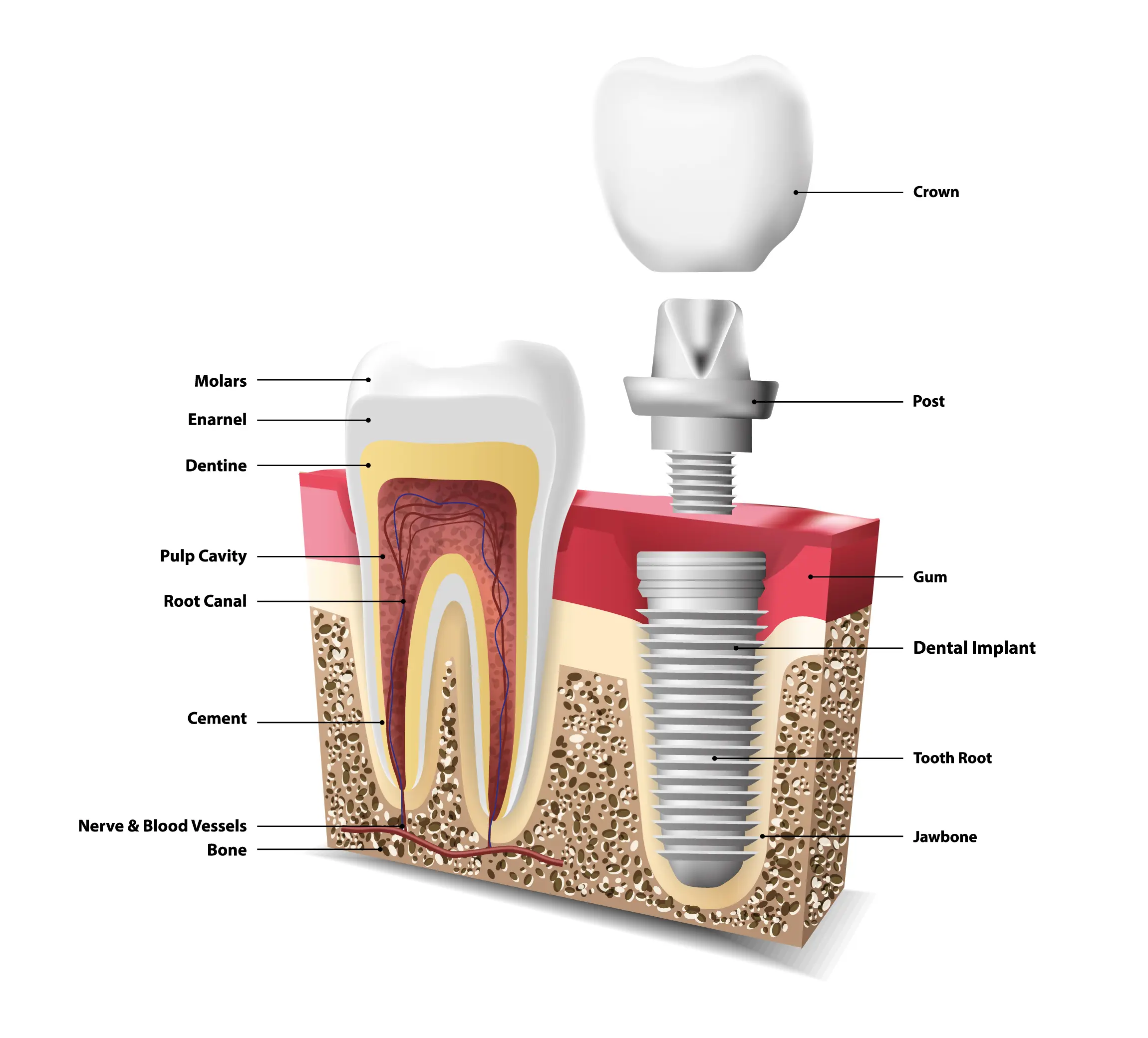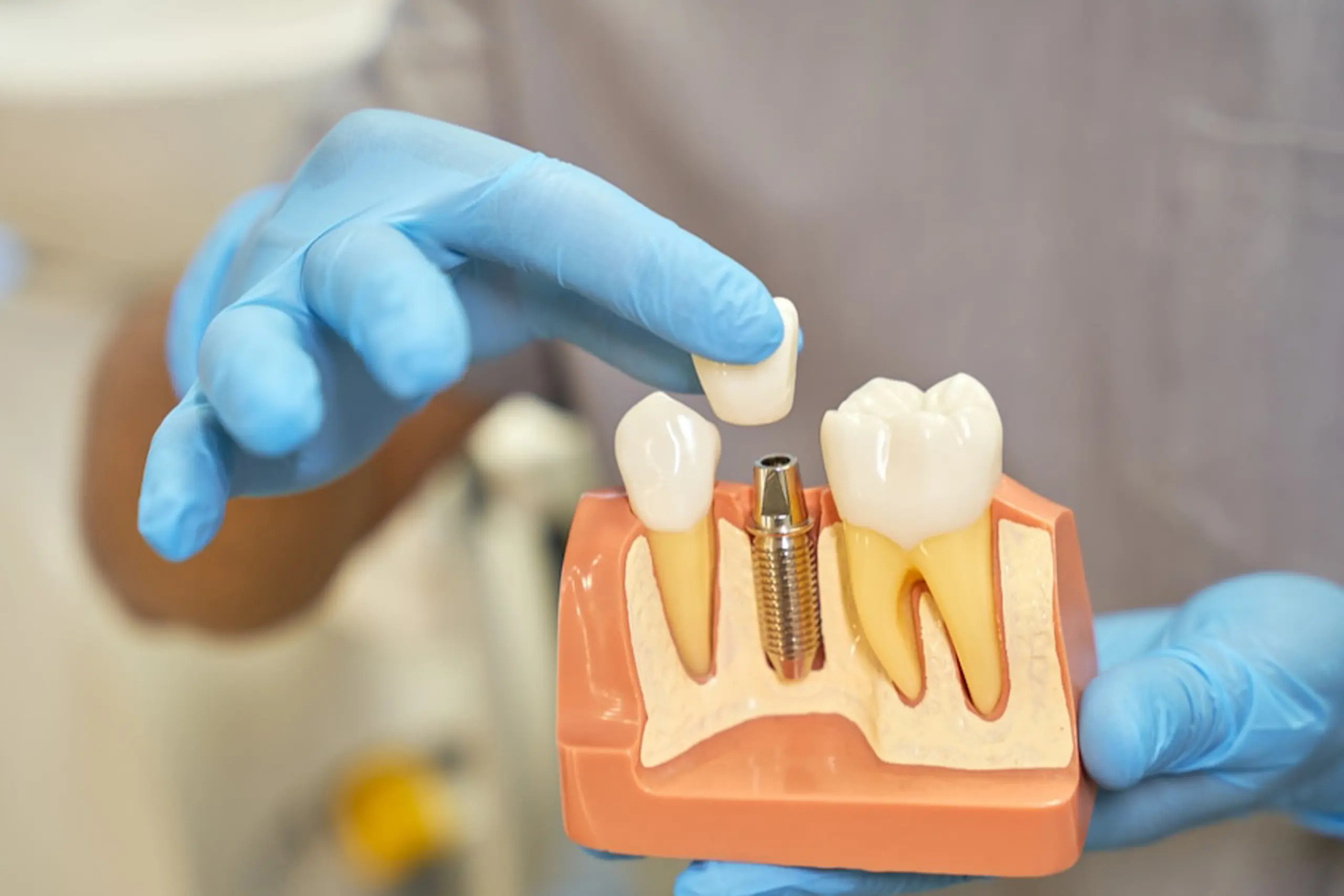dental Implant

Dental Implant
An implant refers to a screw-like structure made of titanium that is inserted into the jawbone to replace missing teeth. This treatment involves placing dental prostheses on these implants, offering a solution that avoids damaging neighboring teeth.
Implant treatment is a procedure where artificial tooth roots are implanted into the jawbone to secure prostheses. Made to replace missing teeth, these implants are designed for long-term use. Typically performed by specialized practitioners in a sterile environment, the implants integrate with the jawbone over a period of about 2-3 months. Successful integration allows for the attachment of artificial tooth root prostheses. However, the suitability of the bone structure and the health of the gums are essential prerequisites for implant application. In cases where these conditions are not met, additional bone surgery may be required to support the implants.
Implant Treatment
After implant treatment, certain guidelines should be followed, such as avoiding spitting and rinsing on the treatment day, refraining from smoking for a week, and adhering to prescribed medications. Patients must also avoid disturbing the surgical area and should not eat or drink for two hours after the procedure.
For patients coming from outside the city or abroad, the clinic offers comprehensive services, including advanced technology, specialized staff, and treatment units. Planning multiple visits for the implant treatment is necessary, and arrangements for accommodation should be made accordingly.

Dental Implant
The clinic offers a range of therapeutic services, including tooth extraction, dental implant applications, soft and hard tissue surgeries, treatment of infections, temporomandibular joint care, and more. Procedures can also be performed under sedation for patients with dental phobia.
In summary, implant treatment involves the insertion of artificial tooth roots to secure prostheses, providing a durable and natural-looking solution for missing teeth. The success of the treatment depends on professional application, suitable conditions, and proper post-treatment care.
dental Implant
Before & After
Treatment Stages
Frequently Asked Questions
A dental implant is a small titanium post that is surgically placed into the jawbone to replace the root of a missing tooth. It serves as a sturdy foundation for a replacement tooth or bridge.
Yes, dental implants are designed to be a permanent solution. With proper care and maintenance, they can last a lifetime.
The dental implant surgery is typically performed under local anesthesia, so patients usually experience minimal discomfort. Post-operative soreness can be managed with over-the-counter pain medications.
The duration varies depending on factors such as the number of implants and the patient’s oral health. On average, the entire process from implant placement to the final restoration can take several months.
Most people with good oral and overall health are candidates for dental implants. Adequate bone density in the jaw is important to support the implant.
Initial healing typically takes about 1-2 weeks. However, complete integration of the implant with the bone may take a few months.
After the initial healing phase, you can gradually return to your regular diet. Dental implants provide stability similar to natural teeth.
Dental implant surgeries have a high success rate. However, like any surgical procedure, there are risks, such as infection, nerve damage, or implant failure. Your dentist will discuss potential risks with you.
Dental implants require the same oral hygiene practices as natural teeth. Brushing, flossing, and regular dental check-ups are essential to maintain the health of your implants.
Yes, dental implants can be used to replace a single missing tooth or multiple teeth. Depending on the case, individual implants, implant-supported bridges, or implant-supported dentures may be recommended.
Age is not a barrier if you’re in good health. Many older adults successfully receive dental implants.
Smoking can impair healing and increase the risk of implant failure. Quitting smoking before and after the procedure is highly recommended.
Costs vary depending on factors like the number of implants, location, and additional procedures required. Consult with your dentist for an accurate estimate.
Gum disease must be treated before considering implants. Healthy gums are essential for the success of dental implant surgery.
In some cases, implants can be placed immediately after extraction. However, the dentist will assess bone quality and healing before proceeding.
Yes, dental implants look, feel, and function like natural teeth. They provide a strong and stable foundation for eating, speaking, and smiling.
Patient Registration Form
SmyrnaMED
Rediscover Your Beauty...
If you are looking for a reliable, friendly, and people-centered approach in the field of Aesthetic Plastic Surgery, Dental Treatment and Hair Transplantation, you are in the right place. SmyrnaMED is just a phone call away.
